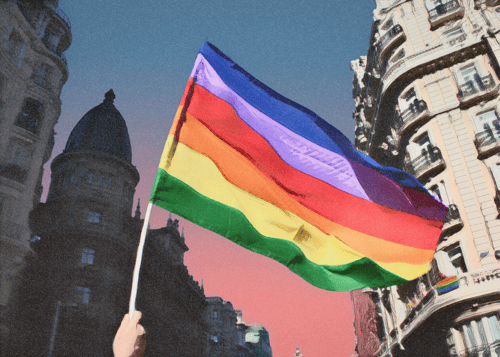
Pride, prejudice, and the KGB
Last weekend, the streets of Riga were filled with thousands of people celebrating diversity and fighting for equality. It was Pride Week and, among the streams of queer people and allies, it was hard to spot the lone protester signs – a significant change from 2005, when protesters outnumbered activists at the country's first Pride.
It's been a long journey for LGBTQ+ rights in the Baltics, with many post-Soviet countries still lagging behind the rest of the continent. The <a href=”https://www.ilga-europe.org/report/rainbow-europe-2023/” style=”text-decoration: underline !important;”>Rainbow Europe map has repeatedly listed Latvia and Lithuania among the worst EU countries to live in if you are queer, only behind Poland, Bulgaria, and Romania.
Nothing to see, nobody to convict
Officially, there were no queer people in the Soviet Union. Homosexuality between men was a criminal offence, but the Soviet press did not report any of the convictions to keep the curated image of the hard-working communist society intact.
Unofficially, as later stories from witnesses of the Soviet times and interviews with queer people reveal, people managed to find a way around, including unofficial meeting points in parks and messages on the walls.
While queer culture was breaking free in the West, the KGB was mapping out gay people beyond the Iron Curtain. In Latvia, for example, when the Soviets took over in the 1940s, homosexuals were either convicted or fired from their jobs. They were also registered, with a special box noting if they had been ”practising pederasty since [year]”.
No space for equality
The isolation behind the Iron Curtain hindered people from accessing information about queers and for queers for many years. The fact that Soviet legislation condemned both homosexuality and pedophilia under the same law did not help. The perception of queer people as ”not normal”, sick, criminal, predatory, or even as spies, stuck in people's minds, isolating sexual minorities both from the rest of society and their own community.
Soviet occupation of the Baltics ended in 1990 and the last trial for consensual homosexual intercourse in Latvia took place in December the same year. Latvia and Estonia decriminalised homosexuality in 1992, with Lithuania following suit the year after.
With much trauma to digest after the end of the occupation, the experience of sexual minorities has been somewhat overlooked. Despite efforts to shake off the Soviet legacy, the narrative of ”the West is bringing gays to Latvia” is still echoing three decades later.
Nonetheless, there are signs of change with Estonia becoming the first post-Soviet country to legalise same-sex marriage last year. Latvians can register civil partnerships starting from 1 July, under a new law that provides some level of state recognition for same-sex partners. Meanwhile, Lithuania is still waiting for its lawmakers to take the final steps to pass a similar law.